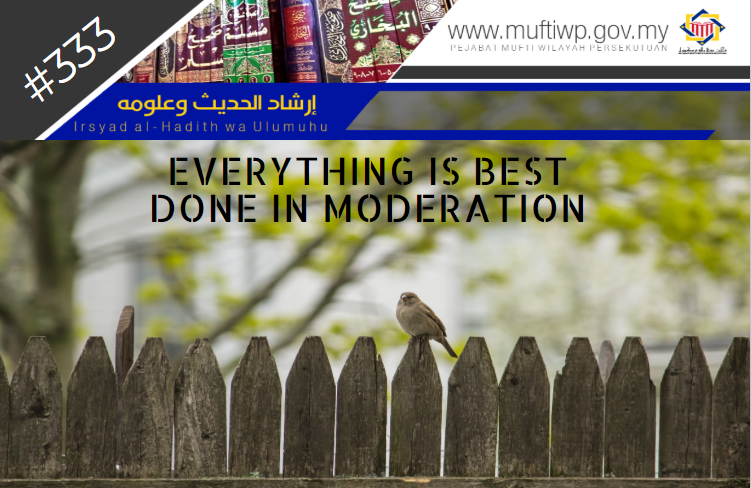Question:
Assalamualaikum wrm.wbt.,
What is the status of this hadith?
It is said that the Prophet PBUH said:
خَيْرُ الْأُمُورِ أَوْسَاطُهَا
“The best of a matter is its moderation.”
Answer:
Waalaikumussalam wrm. wbt.
Alhamdulillah, praise and thanks to Allah for the countless blessings He has blessed us all with. Blessings and salutations to the Prophet Muhammad PBUH, his wives, his family, companions and all those that follow his teachings to the day of judgement.
In the Quran, Allah SWT has created us the ummah of the Prophet Muhammad PBUH as the ummah in the middle, which is those who are eligible to explain to all mankind on what is right and wrong:
- Allah SWT states;
وَكَذَٰلِكَ جَعَلْنَاكُمْ أُمَّةً وَسَطًا لِّتَكُونُوا شُهَدَاءَ عَلَى النَّاسِ وَيَكُونَ الرَّسُولُ عَلَيْكُمْ شَهِيدًا
“And thus, we have made you a just community that you will be witnesses over the people and the Messenger will be a witness over you.”
Surah al-Baqarah (143)
Imam al-Baghawi (510 H) wrote in his commentary from al-Kalbi regarding the meaning “just community” is people or followers who are just between those who are excessive in worship and negligent in fulfilling the Syariah of the religion where both these attributes are reviled in Islam. (See Ma’alim al-Tanzil, 174-175/1)
According to the above question, the hadith is narrated by Imam al-Baihaqi (458 H) in his book:
- From Mutharrif bin Abdillah, he said:
خَيْرُ الْأُمُورِ أَوْسَاطُهَا
“The best of a matter is in moderation.”
Narrated by al-Baihaqi (6176)
Among the scholars who evaluated and issued a ruling on the hadith or narration are:
- Imam al-Baihaqi ruled the sanad of the hadith as munqathi’ (disconnected). (See al-Sunan al-Kubra, 387/3)
- Imam al-Hafiz al-Iraqi (806 H) evaluated the hadith as mu’dhal (there are voids in the sanad of the hadith of two narrators and upwards whether the void is consecutively, at the beginning or end of the sanad). (See al-Mughni ‘an Haml al-Asfar, 939/1)
- Imam al-Hafiz al-Suyuthi (911 H) stated that in the sanad of the hadith or narration there is a narrator of whom his status is unknown. (See al-Durar al-Muntathirah, 116/1)
- Imam Ibn al-Daiba’ al-Syaibani (944 H) said the hadith or narration is narrated with a majhul sanad from al-Baihaqi where the narration is a statement of Mutharrif. (See Tamyiz al-Thoyyib min al-Khabith, 220)
- Imam al-Syaukani (1250 H) cited the opinion of Imam al-Baihaqi stating the narration is mu’dhal. (See al-Fawaid al-Majmu’ah, 251/1)
Considering the above opinions of scholars, we would like to state that the narration or hadith is dhaif (weak) for in the sanad there is more than one abrogated narrator. According to scholars, hadith mu’dhal is worse than hadith munqathi’, for there is only one abrogated narrator in it sanad.
Although in terms of its status the hadith is dhaif (weak), but its meaning is accurate for Islam prohibits its ummah from being excessive (extreme). The reason is there is a hadith which prohibits a person from being excessive in religion.
- From Abdullah bin Mas’ud RA, the Prophet PBUH said:
هَلَكَ الْمُتَنَطِّعُونَ
“Ruined, were those who indulged in hair-splitting.”
Sahih Muslim (2670)
Imam al-Nawawi when commenting the meaning of “الْمُتَنَطِّعُونَ” are those who are too particular, excessive and transgresses the limits in terms of words and actions. (See al-Minhaj, 220/16)
Besides, Islam also prohibits its ummah from being too lax in a certain matter. This should be explained by Imam Ibn al-Qayyim in his book:
“We should understand what is meant by the Prophet PBUH to not be excessive or negligent. Likewise, we cannot make assumptions from the words of the Prophet PBUH what the prophet PBUH meant and also not understand it laxly of the intention of the Prophet PBUH and what the Prophet PBUH meant from hidayah and statement. The reason is if we are negligent in this matter, then it would deviate us and lead us further from the truth of which we do not know except for Allah SWT.” (See al-Roh, 62)
Conclusion
To conclude, the attribute of insof (moderation or just) in every matter is a commandment in Islam. The reason is, extremism or indifference will negatively affect one’s religion and himself. Lastly, may Allah SWT bless us with the attribute of moderation in performing everything and also protect us from extremism and indifference in religion. Amin.
Wallahua’lam.


